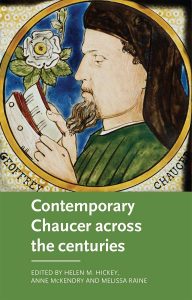 Congratulations to ANZAMEMS members Helen Hickey, Anne McKendry and Melissa Raine on the publication of their co-edited collection Contemporary Chaucer across the Centuries (Manchester University Press, 2018). It is doubly pleasing that the book is a festschrift for long-time ANZAMEMS member and past president Stephanie Trigg, who has contributed so much to the Association and to the wider field of medieval and early modern studies. Below, the editors reflect on what inspired their book and the diverse approaches contributors take to its unifying themes.
Congratulations to ANZAMEMS members Helen Hickey, Anne McKendry and Melissa Raine on the publication of their co-edited collection Contemporary Chaucer across the Centuries (Manchester University Press, 2018). It is doubly pleasing that the book is a festschrift for long-time ANZAMEMS member and past president Stephanie Trigg, who has contributed so much to the Association and to the wider field of medieval and early modern studies. Below, the editors reflect on what inspired their book and the diverse approaches contributors take to its unifying themes.
“We were delighted to take up the opportunity to celebrate Stephanie Trigg’s academic achievements as well as her tireless fostering of scholarly communities throughout her career. Our intention was to create a vibrant collection that attests to her achievements and her generosity as a researcher. We felt that within Stephanie’s wide-ranging interests, Geoffrey Chaucer was central to the progression of her own ideas and her sphere of influence. For over 700 years, many readers have claimed powerful personal connections not only with Chaucer’s writing, but with the author himself. Stephanie’s Congenial Souls (2001) delved deeply into the desires that Chaucer’s literary output has both created and fed throughout those seven centuries. This mode of inquiry, which she describes as a symptomatic long history, makes explicit the stakes and the manoeuvres that give shape to the experience of communing with the Chaucerian text, its author, and the age in which he lived, claims that are at times proprietorial and exclusive, and at others challenging and resistant. Stephanie has since employed this methodology to interrogate hierarchised distinctions between scholarly and creative responses to medieval culture, the latter often known as medievalism. Congenial Souls therefore offers an important contribution to Chaucer scholarship, but further lays down groundwork for researchers of medieval culture to reflect on the broader significance of their own practices.
Two decades after the publication of Congenial Souls, we felt it was timely to review current debates surrounding the traditions, emotions and intellectual underpinnings of Chaucer scholarship, and the implications of this work for researching the Middle Ages more generally. Contemporary Chaucer across the Centuries showcases the contributions of fourteen outstanding thinkers in the field who explore both Chaucer’s writing and the longue durée of its reception. The diversity of topics and approaches evinces the dynamic and innovative research that Chaucer’s writing continues to inspire, as well as the resonance of Stephanie’s insights within contemporary Chaucer research.
Each essay stands alone as a significant contribution to Chaucer scholarship, in some cases drawing attention to features of Chaucer’s poetic techniques and intertextual allusions that have gone unnoticed, despite extensive poring over Chaucer’s oeuvre. Some are inspired by or engage directly with Stephanie’s work on authorship, emotions and medievalism to produce fresh insights into the faces, bodies and environments found within Chaucer’s narratives; others consider emotions and connection with Chaucer himself in critical analyses as well as in creative forms such as cinema and stand-up comedy.
The historical development of Chaucer’s legacy is represented in a variety of contexts, from scribal activity and early print culture through to contests over national identity in the nineteenth century. Several essays address how critical trends and challenges both shape and are impacted by Chaucer’s canonical status, and many individual essays attend to combinations of these themes. Together, they create a dialogue about what the past means in our own present moment, and why Chaucer continues to be such a source of fascination and reward. These essays confirm that we are never truly “done” with the past; we continue to return with new questions to Chaucer’s writing and the astonishing experience of immediacy that it produces in readers even as temporal distance increases. The changing present compels us to reconsider, re-evaluate, and reappraise the connections between literary traditions and contemporary scholarship, and past and present more broadly.
Contemporary Chaucer across the Centuries is also inflected by the diversity of our own research interests. Melissa is currently working on children’s voices in both medieval literature and contemporary Australian culture. In both contexts, she explores how historically specific ideas about childhood, especially the relationships of children with adults, shape the communication of actual and imagined children, including some created by Chaucer. Anne is at the proofing stage of her first monograph, Medieval Crime Fiction: A Critical Overview, which will be published by McFarland in April and offers the first sustained analysis of this neglected but extremely popular example of contemporary medievalism. She is also finalising an article for Exemplaria that considers Chaucer’s Knight’s Tale through Georges Bataille’s theory of an economics of waste. Helen is currently working on feet in medieval and early modern poetics and art, and on ideas of beauty and aesthetics in medieval European poetry. She is completing a chapter on Thomas Hoccleve’s poetics through theories of embodiment.
Helen M. Hickey, Anne McKendry and Melissa Raine are Research Associates at the University of Melbourne’s School of Culture and Communication. A substantial preview of Contemporary Chaucer across the Centuries can be downloaded for free from the publisher’s website: http://www.manchesteruniversitypress.co.uk/9781526129154/
ANZAMEMS members wishing to promote their research through the ANZAMEMS newsletter are invited to email the editor, Amanda McVitty. We particularly welcome approaches from early career scholars.
